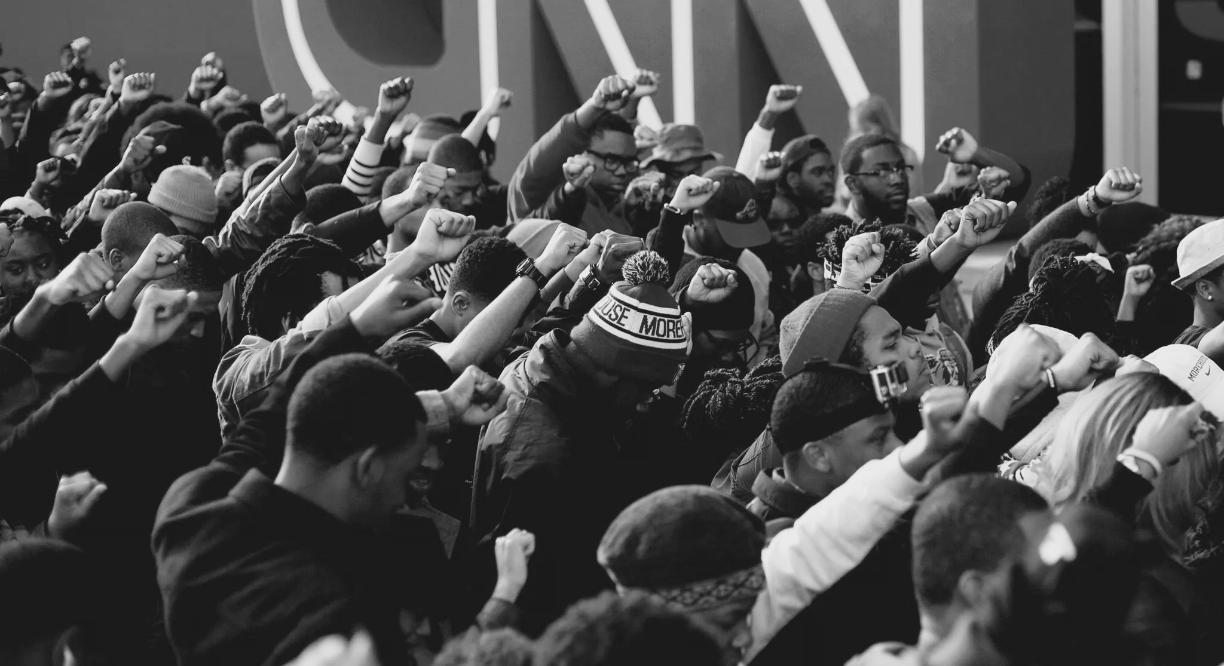This post is part of our Social Impact Summer Series. Initiated by The Institute for Social Justice Inquiry and Praxis and the Faculty Blog editorial team, the Series is meant to facilitate timely reflections and commentaries on unfolding events and to provide space for our faculty colleagues to strategize and coordinate efforts as we work toward freedom for ourselves, our students, and our communities.
______
The static is so difficult. The context seems to never change. The year 1992 – responding to the acquittal of the police who beat down Rodney King — mirrors Atlanta in the wake of the George Floyd police killing. In ’92 we were Molotov-cocktailing an empty cop car and getting tear-gassed by Georgia Red Dogs on Fair street.
It is heartbreaking that we are experiencing this same cycle in the year 2020.
Certainly, teaching at Morehouse is a part of my radical response to the ills of white supremacy. So, too, is my scholarship that looks at the psychological strength of Black men and Black boys.
But, still, the static is so difficult. The piece below is a slight remix of thoughts I penned after Mike Brown’s murder. It is a sin that the piece still plays, just substituting a name or two and details of the killing.
I believe in rage, in protest, in rebellion that turns on its ear norms designed to crush people. I also appreciate the organizations that help to free protesters that are jailed because of their active dissent.
This is a link to organizations that are bailing out protesters.
Rage on.
The killing of George Floyd, an unarmed Black man asphyxiated from a knee to the neck for 8 minutes and 46 seconds by Derek Chauvin, a Minneapolis, Minnesota police officer, is a horror that pushes on the collective conscience of the nation – again. We've been here before. It is soul stirring, but has become normal for those who understand the angles of living as a Black person in the United States of America.
Then there is the other, those who privilege remove and respectability. It must be noted though that the malaise of cognitive dissonance that envelops the 'respectable' in their judgment of the rebellious protester, and even the peaceable one is bound in a national lie. The lie is that we value Black lives. And the rage comes because the lie is told with smiles and platitudes, smoking gun in hand and a corpse at the liar's feet.
Breonna Taylor. George Floyd. Ahmaud Arbery. Michael Brown. Ezell Ford. Eric Garner. Renisha McBride. Trayvon Martin. Tamir Rice. Oscar Grant . . .
The turn, then, is that the protest, the anger, the rage is the truth. It is healthy and justifiable. But we are told to muffle it, conflating "there is never an excuse for violence against police, or for those who would use this tragedy as a cover for vandalism or looting." The statement, wrong on its face, misrepresents the people and core functions of rebellion against a society, and a government, and a city, and its militarized police force with crosshairs trained on the activist as aggressor when terrorism has been visited upon him and her.
Rage here is the real, but not in the Grier and Cobbs (1968) sense, exactly. It is cathartic and common sense. Rage is a hammer, a tool that can be situated to effectively confront and ameliorate violent racism that is pushed onto the Black community. It is a truth that we are told to tuck into a perverted democracy that asks us to play equality by an oppressor's standard.
Rage on then. Inhabit an authentic democratic space demanding the representation of equality. Rage and protest. Rage and read. Rage and write. Rage and learn. Rage and teach. Rage and resist the justified killing of Black people.
With the killing of George Floyd and too many others, to not rage is to lie.
______
David Wall Rice, PhD is Professor of Psychology, Associate Provost and Director of the Institute for Social Justice Inquiry and Praxis, one of four interrelated institutes that comprise the Andrew Young Center for Global Leadership at Morehouse College.

Tag(s):
Morehouse Faculty